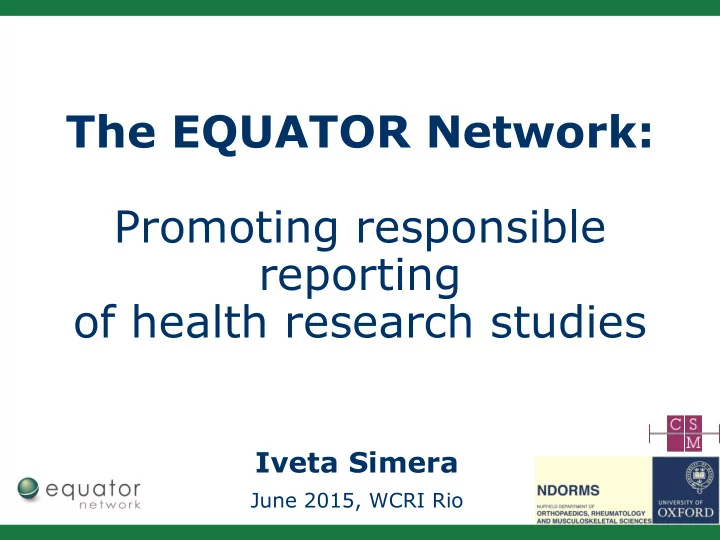

The EQUATOR Network: Promoting responsible reporting of health research studies Iveta Simera June 2015, WCRI Rio
Iveta Simera, EQUATOR Shona Kirtley, EQUATOR Luis Gabriel Cuervo, PAHO/WHO Eleana Villanueva, PAHO/WHO Caroline Struthers, EQUATOR Angela MacCarthy, EQUATOR Doug Altman, EQUATOR UK EQUATOR Centre, University of Oxford Pan American Health Organization (PAHO/WHO) Washington DC 2
EQUATOR Network • International initiative – Aims to improve reliability and value of health research publications by supporting transparent and accurate reporting of research studies • ‘Umbrella’ organisation; key stakeholders: – Authors, editors & peer reviewers, educators; funders .. Everyone interested in improving the quality of research publications and of research itself • Key goals: – To improve people’s health by making • Research publications more reliable • Easier to use research findings – To get the best returns and impact from investment in research for health 3
Why was EQUATOR set up? • Wealth of evidence – widespread problems 4
Why was EQUATOR set up? • ….. Research literature is not fit for purpose 5
Why was EQUATOR set up? • Reporting guidelines exist but they are still not widely used – Adherence to reporting guidelines improves accuracy, completeness and transparency of research reports 6
Why was EQUATOR set up? • Immediate goal To support better publication of research for health • Longer term goal: Through improved reporting of current studies increase the quality of future research ; Promote the generation of relevant, ethical and high quality research 7
EQUATOR focus How we support improvement in research reporting and implementation of reporting guidelines? We foster best practices & standards • Promotion of rigorous research reporting / highlighting problems resulting from inadequate reporting • Provision of resources (e.g. organized validated standards) • Education and training • Research, evaluation, development • Collaboration, global expansion 8
EQUATOR online resources 9
Websites visited from almost every country in the world In 2015: 20-24,000 visits per month 10
Examples of courses and workshops • Targeting – Editors, authors, reviewers – Early career researchers – Research students – Foundation doctors – Research sponsors – Research support staff – Online learning 11
COBWEB study • 41 MSc and PhD students • Evaluation of a simple tool in 4 h writing session • Randomised 6 ‘domains’ of trial report: – trial design, randomisation, blinding, participants, intervention, outcome descriptions • Each student randomly allocated – 3 control domains (no tool, just section heading and empty box) – 3 intervention domains (tool – contained key elements from CONSORT E&E paper with examples of good reporting) • Blinded assessment of outcomes – Completeness of reporting on a scale 0-10 12
COBWEB results: it works! 13
Prestigious Annual Lectures 2015 Dr L.G. Cuervo PAHO 14
EQUATOR – PAHO collaboration: Relevance • Adequate reporting of health research, the development of research reporting standards, improving competencies of and support for human resources involved in research, among other things, are central to leading policies on research for health Policy on Research for Health (Americas) CD49/10 2009 63 rd WHA. WHO Strategy on Research for Health 2010 15
EQUATOR – PAHO Collaboration • Memorandum of understanding, 2010 – Support the Policy on Research for Health of the Americas by raising the standards in the reporting • First projects carried under the memorandum – EQUATOR website and main reporting guidelines translated to Spanish – Promotion of reporting guidelines in Latin America and the Caribbean; awareness raising – Dissemination and promotion of new guidelines (PAJPH) • Other projects – Further development of Spanish / Portuguese resources – Series of webinars on research reporting and reporting guidelines, workshop for journal editors – Librarians’ Network – Integration with scholarships (e.g. OAS, Grupo Coimbra de Universidades Brasileras) and other capacity development programs 16
EQUATOR Spanish website – launched July 2010 www.espanol.equator-network.org www.equator-network.org 17
How to shift the ‘reporting culture’ • Working towards … – Accurate, complete and transparent reporting of research studies is considered the norm • How to achieve this? – Leadership and influence at every level – Clearly defined policies, requirements and expectations – Provision of tools, standards, and other resources – Education, training, advocacy and examples – Motivation and incentives – Application of safeguards and checks • Collaboration of all key stakeholders – Researchers, research organisations, sponsors and regulators – Journals (editors, peer reviewers, publishers) – Other organisations (higher education, IRBs, REC, development and intergovernmental agencies, ...) 18
What can you do to help: promote and practice • All research needs to be well designed , well conducted and well reported to be truly useful and to impact on health improvements • Complete, accurate and transparent reporting is an integral part of responsible research conduct • Adherence to reporting guidelines – Decreases honest reporting errors and omissions – Improves the reliability, usability and usefulness of publications • Integrate these guidelines with – Research management and review processes (e.g. journals, IRBs / RECs, thesis review panels, etc) – High education activities 19
“Without accessible and usable reports, research cannot help patients and their clinicians.” Chalmers I. & Glasziou P. Avoidable waste in the production and reporting of research evidence. Lancet 2009 www.equator-network.org iveta.simera@csm.ox.ac.uk 20
Recommend
More recommend